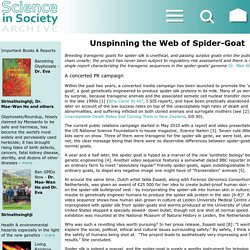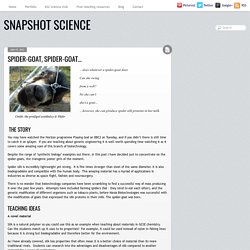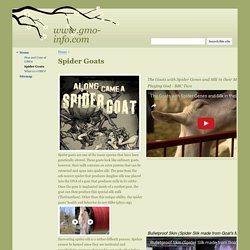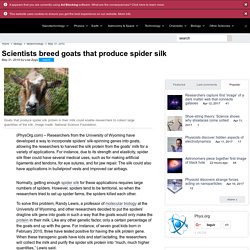

Unspinning the Web of Spider-Goat. Breeding transgenic goats for spider silk is unethical, and passing surplus goats onto the public food chain unsafe; the project has never been subject to regulatory risk assessment and there is not a single report characterizing the transgenic sequences in the spider-goats’ genome Dr.

Mae-Wan Ho A concerted PR campaign Within the past two years, a concerted media campaign has been launched to promote the ‘spider-goat’, a goat genetically engineered to produce spider silk proteins in its milk. Many of us were caught by surprise, because transgenic animals and the associated somatic cell nuclear transfer cloning began in the late 1990s [1] (Why Clone At All?
, I-SIS report), and have been practically abandoned a decade later on account of the low success rates on top of the unacceptably high rates of death and abnormalities, and suffering inflicted on both cloned animals and surrogate mothers (see [2] Unacceptable Death Rates End Cloning Trials in New Zealand, SiS 50). References Ho MW. Spider-goats. Credit: the prodigal untitled13 @ Flickr …does whatever a spider-goat does.Can she swingfrom a web?

No she can’tshe’s a goat……however, she can produce spider silk proteins in her milk. The story You may have watched the Horizon programme Playing God on BBC2 on Tuesday, and if you didn’t there is still time to catch it on iplayer. If you are teaching about genetic engineering it is well worth spending time watching it as it covers some amazing uses of this branch of biotechnology. Despite the range of ‘synthetic biology’ examples out there, in this post I have decided just to concentrate on the spider-goats, the transgenic poster girls of the moment. Spider silk is incredibly lightweight yet strong.
There is no wonder that biotechnology companies have been scrambling to find a successful way of mass producing it over the past few years. Teaching ideas A novel material. Spider Goats - www.gmo-info.com. Spider goats are one of the many species that have been genetically altered.

These goats look like ordinary goats, however, their milk contains an extra protein that can be extracted and spun into spider silk. The gene from the orb-weaver spider that produces dragline silk was placed into the DNA of a goat that produces milk in its udder . Once the gene is implanted inside of a mother goat, the goat can then produce this special silk milk (TheGuardian). Other than this unique ability, the spider goats' health and behavior do not differ (phys.org). Harvesting spider silk is a rather difficult process. The Goats with Spider Genes and Silk in their Milk - Horizon: Playing God - BBC Two Bulletproof Skin (Spider Silk made from Goat's Milk) "Synthetic Biology and the Rise of the 'spider-goats'" Www.theguardian.com. Woodford, Chris. "Scientists Breed Goats That Produce Spider Silk.
" Meet the Spider Goat. Untitled. Untitled. Untitled. Scientists breed goats that produce spider silk. (PhysOrg.com) -- Researchers from the University of Wyoming have developed a way to incorporate spiders' silk-spinning genes into goats, allowing the researchers to harvest the silk protein from the goats’ milk for a variety of applications.

For instance, due to its strength and elasticity, spider silk fiber could have several medical uses, such as for making artificial ligaments and tendons, for eye sutures, and for jaw repair. The silk could also have applications in bulletproof vests and improved car airbags. Normally, getting enough spider silk for these applications requires large numbers of spiders. However, spiders tend to be territorial, so when the researchers tried to set up spider farms, the spiders killed each other.
To solve this problem, Randy Lewis, a professor of molecular biology at the University of Wyoming, and other researchers decided to put the spiders’ dragline silk gene into goats in such a way that the goats would only make the protein in their milk.